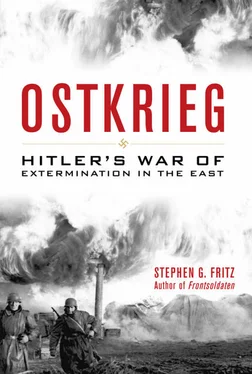If this radical anti-Semitism gave Hitler’s ideology its manic dynamism, it was Lebensraum that provided the vital link between dogma and a pragmatic program of territorial expansion. Notions of living space and expansion in the east were common currency in Germany both before and especially after World War I. Based on work by geopolitical theorists such as Friedrich Ratzel and Karl Haushofer, and popularized in the 1920s by Hans Grimm’s best-selling novel Volk ohne Raum (People without space), Lebensraum stressed the necessity of a policy of expansion in order to achieve a positive ratio between population and resources. Ratzel emphasized that healthy states needed to expand and grow in order to survive, an idea hardly unique to Germany at the turn of the century. The British “hunger” blockade between 1914 and 1919, a plebeian form of killing that nonetheless had a profound impact on shaping Hitler’s ideas, seemed to confirm the truth of these notions. Responsible for the death by starvation of perhaps 750,000 civilians, and regarded by many Germans as the main culprit in the collapse of the war effort, the blockade reinforced and gave legitimacy in the minds of millions of Germans to the urgency of securing living space. For Hitler, it provided proof of his contentions and justification for his actions: the decisive factor in the struggle for survival was obtaining the means by which the German nation could sustain itself. The Great War had clearly demonstrated that Germany, a resource-poor nation surrounded by hostile powers, possessed insufficient resources and was, thus, vulnerable to the murderous actions of its enemies. If Germany was to survive, it had to gain living space. 9
Viewed from the perspective of the 1920s, Germany faced a series of stark choices: attempt to resurrect the liberal economic policy of free trade and export orientation that had characterized imperial Germany; promote a policy of colonial expansion to secure vital resources; or promote a policy of contiguous expansion to secure Lebensraum in Eastern Europe. As Hitler assessed the situation, the first two choices offered no realistic alternative, the first because Great Britain and the United States dominated the global trading system, German exports faced increasing trade barriers, and reliance on foreign trade did not solve Germany’s ultimate problem. As World War I had demonstrated, its enemies, organized by the international Jewish conspiracy, could easily cut off imports and force Germany into defeat. The second option not only dispersed the German racial core but was also completely untenable in any case: no suitable land for colonization outside Europe existed, and Britain had in 1914 already shown its willingness to organize a coalition to quash German economic, naval, and colonial competition. 10
As Adam Tooze has argued, from the vantage point of the early 1930s Germans looked back on a twenty-year period in which economic decline and insecurity dominated their experience. Despite their hard work, diligence, and technology, their country was poor, especially in comparison with the United States. Playing within the rules of the economic game as devised by the British and now dominated by the Americans clearly had not worked. Moreover, the Great Depression seemingly had made a mockery of the liberal doctrine of economic progress and only reinforced Hitler’s notion that, in economics, as in race, life was an unceasing process of struggle for survival. As he stressed in 1928, the huge difference in living standards between the United States and Germany could be understood only in terms of the American advantages in resources and space. Now, in the midst of the Depression, his basic Darwinian outlook and economic understanding combined to point in one direction: the solution to the existential threats facing Germany, both economic and racial, lay in the conquest of Lebensraum in the east. “And so we National Socialists consciously draw a line beneath the foreign policy tendency of our pre-war period,” Hitler emphasized in Mein Kampf . “We take up where we broke off six hundred years ago. We stop the endless German movement to the south and west, and turn our gaze toward the land in the east. At long last we break off the colonial and commercial policy of the pre-war period and shift to the soil policy of the future. If we speak of soil in Europe today, we can primarily have in mind only Russia and her vassal border states.” 11
Not only did expansion in the east accord with Hitler’s ideology, but it also seemed to offer the fewest risks. Germany would conquer the necessary living space at the expense of the allegedly racially inferior Slavs, secure for Germany the resources needed to make it self-sufficient and powerful, and put it in position to wage a successful struggle against the Jewish-Bolshevik enemy. Moreover, expansion in the east seemed promising because Jewish-Bolshevik rule had, in Hitler’s opinion, already ruined the Russian state and left it ripe for collapse. “The struggle for world hegemony,” he claimed, betraying his constant obsession with World War I, “will be decided for Europe by the possession of Russia’s space: this will make Europe the most blockade-proof spot in the world.” Finally, Hitler believed that such eastward expansion posed no fundamental threat to the British Empire. Thus, if Germany pursued a purely continental policy and avoided any challenge to Britain’s colonial or commercial interests, which Hitler believed had been the key mistake of German governments before 1914, Britain might even aid in the destruction of Russia. Indeed, throughout the 1920s and 1930s, and even in the first years of World War II, he persisted in the belief that Britain would, ultimately, be an ally of German-dominated Europe in the eventual struggle with the United States for world domination. 12
By the mid-1920s, then, Hitler had established in his own mind the key link between the destruction of Jewish-Bolshevism and the acquisition of Lebensraum in the east, both of which were necessary in order to secure Germany’s existence. In the desperate period following World War I, this potent combination of nineteenth-century notions of social Darwinism, imperialism, racism, and anti-Semitism provided a seemingly plausible explanation for Germany’s current quandary and a prescription for action to save and renew the nation. Once established, the quest for Lebensraum and the final reckoning with Jewish-Bolshevism remained the cornerstone of Hitler’s life’s work: only the conquest of living space could make good the mistakes of the past, preserve the racial value of the German Volk , and provide the resources to lift Germany out of its economic misery. Just a few days after becoming chancellor, Hitler announced unequivocally to his startled generals that his aim was “to conquer and ruthlessly Germanize new living space in the east.” Everything, he stressed, had to be geared toward securing German predominance in Europe. From his first days in office, then, Hitler began preparing for war, for the struggle, as he saw it, for Germany’s existence. 13
Adolf Hitler was not one to appreciate paradox—he was far too humorless and self-absorbed for that. If he had been more detached, however, he might well have appreciated the great historical irony that confronted him in September 1939. Instead, his chief interpreter, Paul Schmidt, perfectly captured the Führer’s mood on the early evening of 3 September 1939. Having been summoned to the Reich Chancellery to translate the British declaration of war, Schmidt described the funereal scene:
After I finished there was total silence…. Hitler sat there as if petrified and stared straight ahead. He… did not rant and rave…. He sat in his seat completely quiet and motionless. After a while, which seemed like an eternity…, he turned to Ribbentrop who kept standing at the window as if frozen. “What now?” Hitler asked his Foreign Minister with a furious gaze in his eyes as if he wanted to indicate that Ribbentrop had misinformed him about the reaction of the British…. Goering turned to me and said: “If we lose this war, may Heaven have mercy on us!”
Читать дальше












